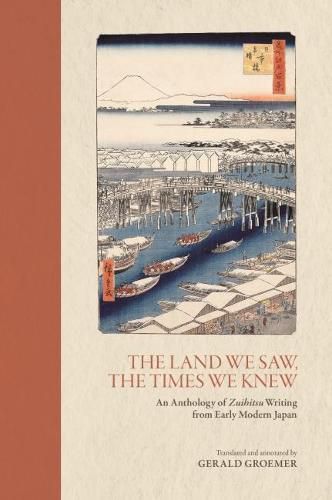Readings Newsletter
Become a Readings Member to make your shopping experience even easier.
Sign in or sign up for free!
You’re not far away from qualifying for FREE standard shipping within Australia
You’ve qualified for FREE standard shipping within Australia
The cart is loading…






Japanese zuihitsu (essays) offer a treasure trove of information and insights rarely found in any other genre of Japanese writing. Especially during their golden age, the Edo period (1600-1868), zuihitsu treated a great variety of subjects. In the pages of a typical zuihitsu the reader encountered facts and opinions on everything from martial arts to music, food to fashions, dragons to drama-much of it written casually and seemingly without concern for form or order. The seven zuihitsu translated and annotated in this volume date from the early seventeenth to the late nineteenth centuries. Some of the essays are famous while others are less well known, but none have been published in their entirety in any Western language.
Following a substantial introduction outlining the development of the genre, Tales That Come to Mind is an early seventeenth-century account of Edo kabuki theater and the Yoshiwara pleasure quarters penned by a Buddhist monk. A Record of Seven Offered Treasures, composed by a retired samurai-monk near the end of the seventeenth century, starts as a treatise on the proper education of youth but ends as a critique of the author’s own life and moral failings. Perhaps the most famous piece in the volume, Monologue, was drafted by the renowned Confucianist Dazai Shundai, a keen and insightful observer of life during the late seventeenth and early eighteenth centuries. Dazai treats, in turn, poetry, the tea ceremony, comic verse, music, theater, and fashion. Idle Talk of Nagasaki is an entertaining record of a journey to Nagasaki by a group of Confucianists in the early eighteenth century. In Kyoto Observed, a mid-eighteenth-century Edo resident compares the shogun’s and the emperor’s capital in a series of brief vignettes. An 1814 zuihitsu classic written by a physician, A Dustheap of Discourses presents another colorful mosaic of topics related to life in Edo. The book closes with The Breezes of Osaka, a lively essay by a highly cultured Edo administrator contrasting the food, life, and culture of his hometown with that of Osaka, where he briefly served as mayor in the 1850s.
$9.00 standard shipping within Australia
FREE standard shipping within Australia for orders over $100.00
Express & International shipping calculated at checkout
Japanese zuihitsu (essays) offer a treasure trove of information and insights rarely found in any other genre of Japanese writing. Especially during their golden age, the Edo period (1600-1868), zuihitsu treated a great variety of subjects. In the pages of a typical zuihitsu the reader encountered facts and opinions on everything from martial arts to music, food to fashions, dragons to drama-much of it written casually and seemingly without concern for form or order. The seven zuihitsu translated and annotated in this volume date from the early seventeenth to the late nineteenth centuries. Some of the essays are famous while others are less well known, but none have been published in their entirety in any Western language.
Following a substantial introduction outlining the development of the genre, Tales That Come to Mind is an early seventeenth-century account of Edo kabuki theater and the Yoshiwara pleasure quarters penned by a Buddhist monk. A Record of Seven Offered Treasures, composed by a retired samurai-monk near the end of the seventeenth century, starts as a treatise on the proper education of youth but ends as a critique of the author’s own life and moral failings. Perhaps the most famous piece in the volume, Monologue, was drafted by the renowned Confucianist Dazai Shundai, a keen and insightful observer of life during the late seventeenth and early eighteenth centuries. Dazai treats, in turn, poetry, the tea ceremony, comic verse, music, theater, and fashion. Idle Talk of Nagasaki is an entertaining record of a journey to Nagasaki by a group of Confucianists in the early eighteenth century. In Kyoto Observed, a mid-eighteenth-century Edo resident compares the shogun’s and the emperor’s capital in a series of brief vignettes. An 1814 zuihitsu classic written by a physician, A Dustheap of Discourses presents another colorful mosaic of topics related to life in Edo. The book closes with The Breezes of Osaka, a lively essay by a highly cultured Edo administrator contrasting the food, life, and culture of his hometown with that of Osaka, where he briefly served as mayor in the 1850s.